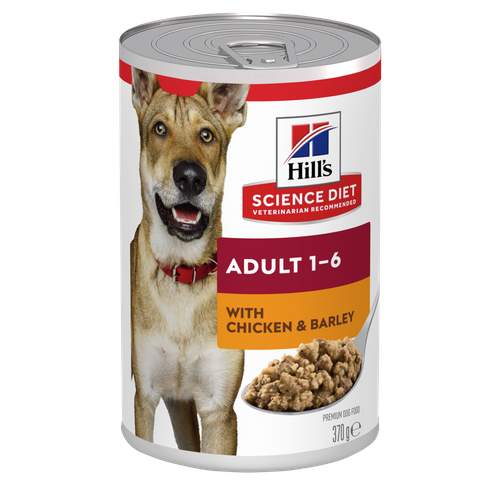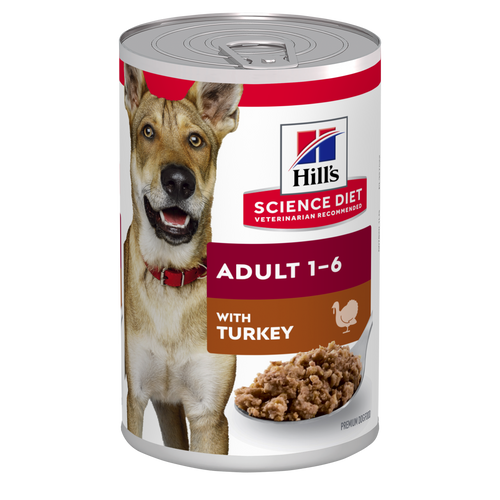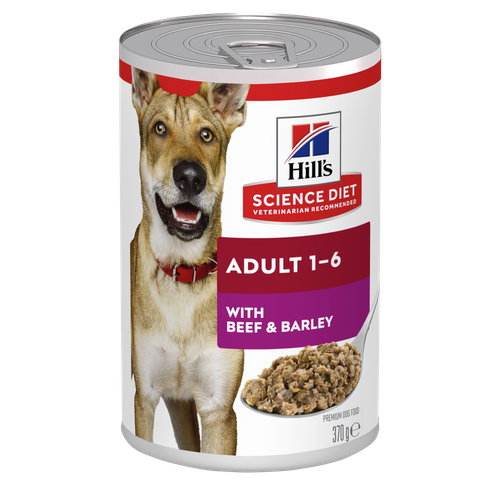
-
Find the right food for your petTake this quiz to see which food may be the best for your furry friend.Find the right food for your petTake this quiz to see which food may be the best for your furry friend.Health CategoryFeatured products
 Adult with Chicken & Barley Wet Dog Food
Adult with Chicken & Barley Wet Dog FoodChicken & Barley recipe with precisely balanced nutrition to keep Adult dogs active and healthy
Shop Now Adult with Turkey Wet Dog Food
Adult with Turkey Wet Dog FoodTurkey & Barley recipe with precisely balanced nutrition to keep Adult dogs active and healthy
Shop Now Adult with Beef & Barley Dog Food
Adult with Beef & Barley Dog FoodBeef & Barley recipe with precisely balanced nutrition to keep Adult dogs active and healthy
Shop NowFeatured products Sensitive Stomach & Skin Chicken & Beef Dinner
Sensitive Stomach & Skin Chicken & Beef DinnerGourmet daily nutrition, carefully made. Tasty chunks with chicken & beef in a decadent gravy. Supports digestive health, nourishes skin and promotes a lustrous fur.
Shop Now Adult Chicken & Spinach Casserole Cat Food
Adult Chicken & Spinach Casserole Cat FoodWith delicious chunks in a decadent gravy
Shop Now Adult 7+ Tender Tuna Dinner Cat Food
Adult 7+ Tender Tuna Dinner Cat FoodWith delicious chunks in a decadent gravy
Shop Now -
DogCat
- Cat Tips & Articles
-
Health Category
- Weight
- Skin & Food Sensitivities
- Urinary
- Digestive
- Kidney
- Dental
- Serious Illness
-
Life Stage
- Kitten Nutrition
- Adult Nutrition
Featured articles Water
WaterWater is the most important nutrient of all and essential for life. Animals can lose almost all their fat and half their protein and still survive, but if they lose 15% of their water, it will mean death.
Read More Pet Food Storage Tips
Pet Food Storage TipsWhere you store your cat and dog food can make a big difference in the quality and freshness once it is opened. Here are some common questions and recommendations for optimal storage for all of Hill’s dry and canned cat and dog food.
Read MoreHill's Australian Bushfire EffortsRead More -


As a pet parent, you may be shocked to find worms in dog poop — but you're not alone. Intestinal parasites including hookworms, roundworms, whipworms and tapeworms are common in dogs. Worms can often cause a variety of health concerns as they're highly contagious. These parasites may often go undetected as well if your dog isn't taken in for routine checkups with your veterinarian for microscopic worm eggs in dog poop. If you want to keep your dog free of worms, keep reading to learn more about how to spot worms in your dog's faeces and how they may affect your dog's health.
How Do Worms Affect Your Dog and Their Health?
Your dog's health, size and age will play a large role in how intestinal worms will affect their overall health. The type and number of worms a dog is infected with are also important to note. Worms not only live in the stomach and intestines, but they can also be found in the heart, kidneys, lungs and other organs. Keep in mind that ringworm, which is also seen in dogs, isn't actually a worm but a fungus.

Dogs can contract intestinal worms in several ways. A mother dog can pass worms to her puppies in the womb or when nursing. Dogs can also become infected with worms by ingesting dog poop that contains worm eggs or eating another animals poop that's infected with worms. Dogs can become infected with tapeworms if they ingest a flea that contains tapeworm larvae. Worms are obligate parasites that get all of their nutrition from their host. Dogs who are smaller, younger and/or have a compromised immune system may be more prone to developing worms in their poop than others.
The most obvious one is that you might see worms in your dog's poop, intestinal worms may also cause:
- Diarrhoea containing blood or mucus
- Vomiting
- Failure to thrive
- Excessive exhaustion
- Abdominal bloating
- Poor hair coat
- Loss of appetite
- Weight loss (despite voracious appetite)
- Pale gums
- Coughing (if the worms invade the lungs)
If you notice any of these clinical signs, call your veterinarian as soon as possible. Note that some intestinal worms, including hookworms and roundworms, are contagious to humans and are considered a human health risk. In addition, some worms, like roundworms, can live in soil for years and continually reinfect animals that come into contact with the eggs.


Tasty Tips
What Are the Signs of Worms in Dog Poop?
The four main worms found in dog poop are hookworms, whipworms, roundworms and tapeworms.
- Hookworms are tiny, thin worms with hook-like mouth parts.
- Whipworms look like tiny pieces of thread that are enlarged on one end.
- Roundworms look like spaghetti and may be several inches long.
- Tapeworms aren't usually seen in dog poop, but their egg sacs, which look like grains of rice, can be found in dog poop or sticking to a dog's behind.

The best way to identify worms in dog poop is to take any worms you find along with a sample of your dog's poop to your veterinarian, who will help you identify and treat any parasites. Most of the time you won't see adult worms, so they're usually diagnosed by a veterinary professional with a faecal float test. The poop sample is dissolved in a special solution and spun in a centrifuge to be examined under a microscope to look for worm eggs in dog poop.
Tasty Tips
How often should your dog visit the veterinarian?
Puppies may need several visits in their first year for vaccinations. Adult dogs generally benefit from annual check-ups, while senior or special-needs dogs might require more frequent visits.
Your dog's health, size and age will play a large role in how intestinal worms will affect their overall health.
Dr. Sarah Wooten
How Are Intestinal Worms Treated?
Fortunately, worms in dog poop are usually easily treated. Depending on the type of worm(s) that your dog has, your veterinarian will prescribe a dewormer that will kill any adult worms your dog is harbouring. Dewormers that may be prescribed can include fenbendazole, milbemycin, praziquantel, moxidectin or pyrantel pamoate, and they come in many forms, including liquid medication, injections, tablets, topical forms or chew forms. Dewormers require only one or a few doses, making them safe, effective, inexpensive and easy. If you notice that your dog passes worms after being dewormed, either in the stool or vomiting, that means that the dewormer is doing its job.
Made for dogs, led by science
We believe that science is the best path to giving your pet the best care possible.
How Can You Prevent Worms?
Once your dog is worm-free, be sure to talk to your veterinarian about monthly worm prevention. Many monthly heartworm prevention medications include intestinal parasite prevention medication as well, making total worm prevention easy. These medications work by killing any intestinal parasites that your dog is exposed to. For these medications to work properly, give them to your dog as directed.
In addition to giving your dog a monthly broad-spectrum worm prevention medication, it's also recommended that you have your dog's stool checked every 6 to 12 months for microscopic parasite eggs. No medication works 100% of the time, so having your dog's poop checked regularly will ensure that the monthly prevention is doing its job of keeping worms out of your dog and out of your life.


Dr. Sarah Wooten graduated from UC Davis School of Veterinary Medicine in 2002. A member of the American Society of Veterinary Journalists, Dr. Wooten divides her professional time between small animal practice in Greeley, Colorado, public speaking on associate issues, leadership, and client communication, and writing. She enjoys camping with her family, skiing, SCUBA, and participating in triathlons.
Related products

Supports energy level and beautiful coat in mature dogs who prefer smaller kibble

Clinically proven kibble technology to reduce plaque & tartar build-up, specially designed for small & mini dogs

Supports healthy joints, lean muscle, and beautiful coat for large breed dogs

Supports lean muscle for dogs who prefer smaller kibble
Related articles

As small and toy breed dogs age, their nutritional needs change.

Selecting the right food for your puppy is a key to quality nutrition and a long, healthy life., Learn more about how to select the right puppy food.

Learn how today's wet dog food blends have gotten a face lift, and how you'll provide your dog the nutrition he needs in the form he loves.

Extra pounds can cause problems for your dog's overall health. Learn the signs that your dog might be overweight, and what you can do to manage its weight.

Put your dog on a diet without them knowing
Our low calorie formula helps you control your dog's weight. It's packed with high-quality protein for building lean muscles, and made with purposeful ingredients for a flavorful, nutritious meal. Clinically proven antioxidants, Vitamin C+E, help promote a healthy immune system.
Put your dog on a diet without them knowing
Our low calorie formula helps you control your dog's weight. It's packed with high-quality protein for building lean muscles, and made with purposeful ingredients for a flavorful, nutritious meal. Clinically proven antioxidants, Vitamin C+E, help promote a healthy immune system.

